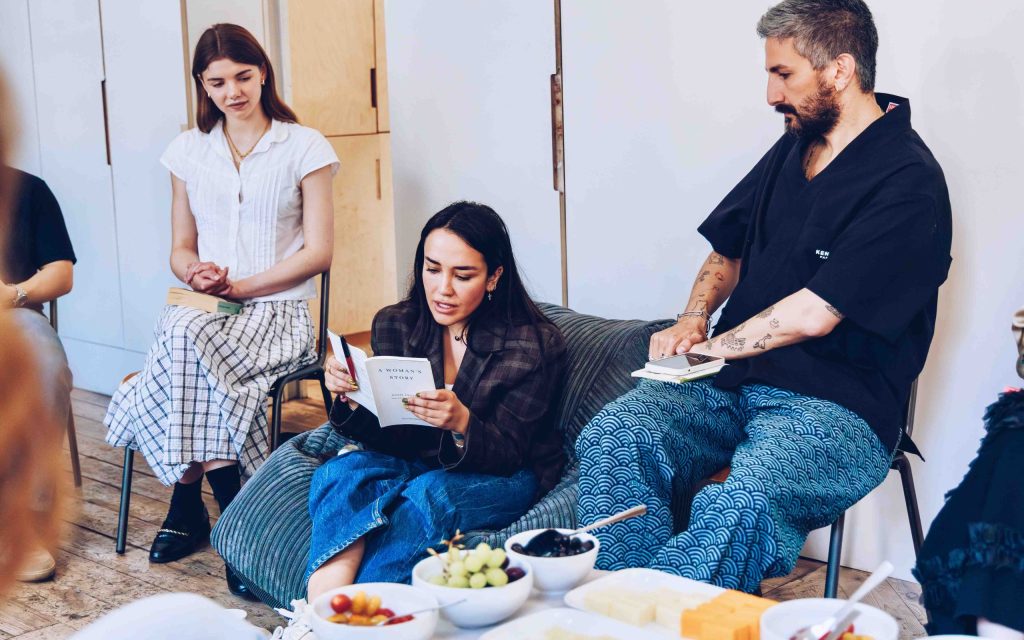
Photo: Vera Novikova
This piece, co-published by Delfina Foundation and Art Unlimited, by artist Huo Rf outlines his research during his residency at Delfina Foundation in spring 2025. During his residency at Delfina Foundation, Huo Rf focused on deepening his exploration of ageing as a complex, multidimensional phenomenon. He investigated the societal, queer, and institutional perspectives on ageing, integrating these insights into his research. This culminated in a book club event on 2 May 2025 at Delfina Foundation, where participants shared their thoughts on the process of ageing. The text here outlines Huo’s reflections on ageing as well as quotes from participants from the event.
As I began to look at my personal experiences and the past three years in a more structured way, I started to think of ageing as akin to climbing a mountain. As you ascend, time passes, physical effort increases, the body tires—yet at the same time, the view begins to grow more beautiful. Recognising that view is directly connected to time and attention.
My interest in the concept of ageing began with a shift in my relationship with my mother, who holds an important place in my artistic practice. As she entered her seventies, our relationship underwent a visible transformation. At first, I was focused on her ageing process and the changes it brought; but gradually, other themes emerged—my own ageing, my desire to slow down, my embrace of this pace, and watching those age around me –even my cat.
As I reviewed the applications I submitted within the arts and culture field, I began to notice how not only my application materials had matured, but also how open calls themselves had “aged” over time, where juries remain the same, stuck in an endless cycle. This observation offered new insights into the different ways ageing can be approached, and why and how it should be studied.
Seeing ageing not only as a biological process, but also as something related to digesting what we eat and drink, processing what we experience, and turning this into a more meaningful and productive process through solidarity and sharing— began to shift my understanding of ageing entirely.
With a more specific focus on queer ageing, I aimed to think, understand, and research further—to connect with already-won rights within the community, and accumulated experiences. For this purpose, I was selected to be a part of Delfina Foundation’s artist-in-residence program, where I had the chance to explore and make sense of this process more deeply, drawing on the rich archives of London’s cultural institutions.
On Friday, May 2nd, as part of my residency at Delfina Foundation, I hosted a book club on my research topic, ageing. This intimate gathering, which lasted about two hours, began with a light Turkish breakfast I prepared and gradually unfolded into deep and layered conversations. Throughout the event, we repeatedly returned to the idea that ageing is not merely a biological process but a complex phenomenon with emotional, social, cultural, and political dimensions.
I invited participants to bring a book that resonated with their experiences of ageing, read a short excerpt, and share why they had chosen it. These contributions went beyond individual storytelling—they created a collective space of remembrance, confrontation, reciprocity, and acceptance. Some participants realised they had never truly thought about ageing before; others voiced, for the first time, things they had long avoided saying aloud.
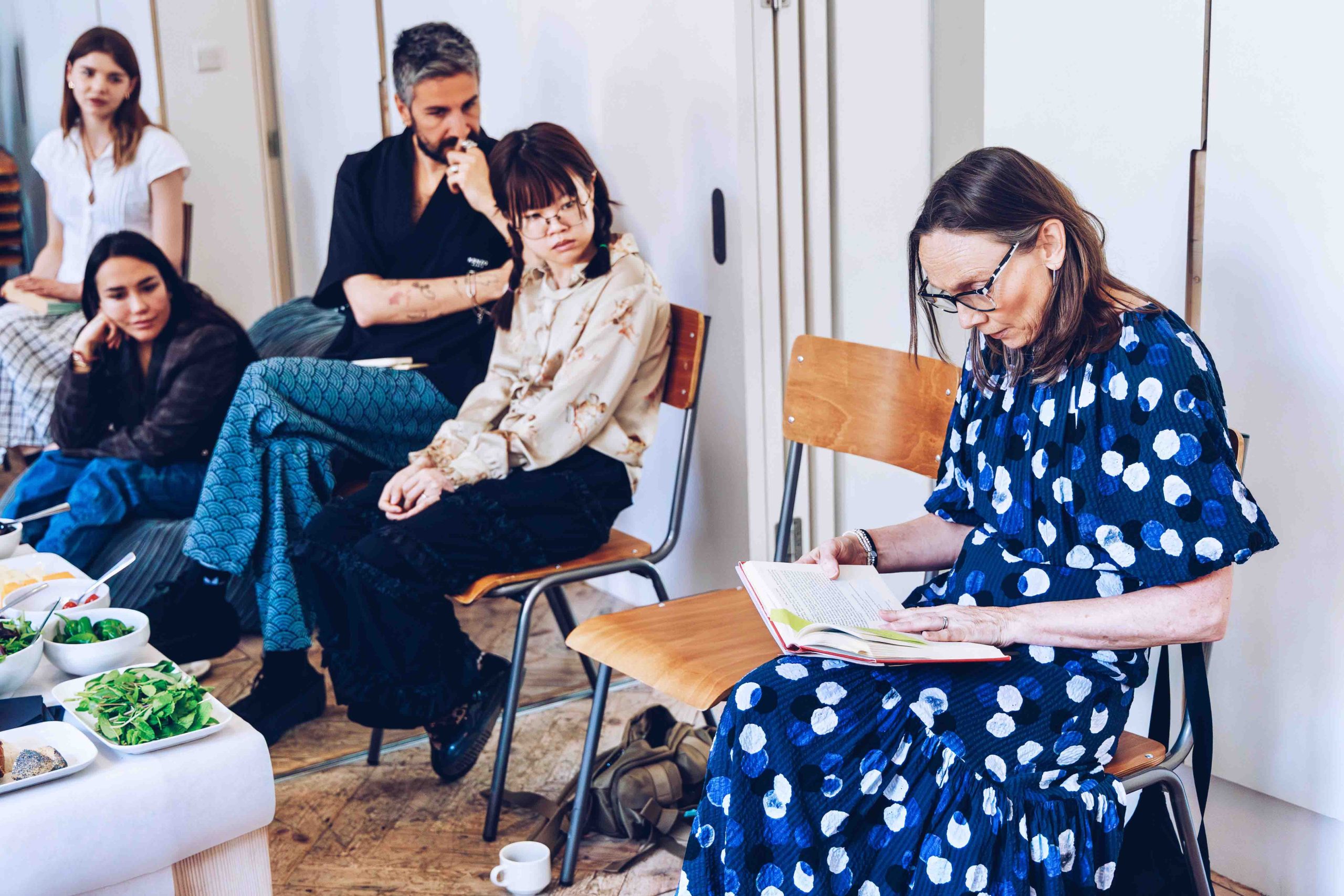
I chose to keep this event closed. The invitees were composed of individuals connected to my research topic throughout the duration of the program. Since I began working on this topic, I have observed that conversations about ageing often begin with silence—imbued with shame, grief, vulnerability, and a quiet sense of gratitude. I believed that constituting a space for sincere and honest reflections would only be possible in a private setting, built on trust. The participants came from diverse age groups and life experiences. This diversity enriched the gathering, as people from various professions and cultural backgrounds shared their perspectives. Together, we discovered that ageing is not a singular but a plural experience, fragile yet expansive.
The result of this book club was not merely a collage of selected excerpts; it became a trace of collective memory, of thinking and ageing together. Each reading offered a glimpse of someone else’s age, time, memory, body, and perception of life. In this way, ageing emerged not just as a process, but as a shared, spoken, and transformable experience.
Below is a selection of the excerpts and reflections that flowed through the conversations:
Suresh Rattan – Age
Excerpt shared by: Huo Rf
While hosting the event, I wanted to frame aging not as a burden to be endured, but as a practice of embracing all of our ages. Rattan’s words embodied this approach: “I am ready to live all of my ages — from the very beginning to… well, however far it goes, who knows? And with that, dear reader, I wish us all a Happy Aging, at every stage of life.” These lines propose to think of aging as a continuum instead of an ending.
Lynne Segal – Out of Time: The Pleasures and the Perils of Ageing
Excerpt shared by: Julia Nurse
Segal’s reflections on May Sarton revealed how old age can be a profoundly creative time. Sarton’s words left a lasting impression: “I love being old… I am surer about what my life is about, have less self-doubt to conquer.” This passage presents aging not as unraveling, but as a moment of deepened self-assurance.
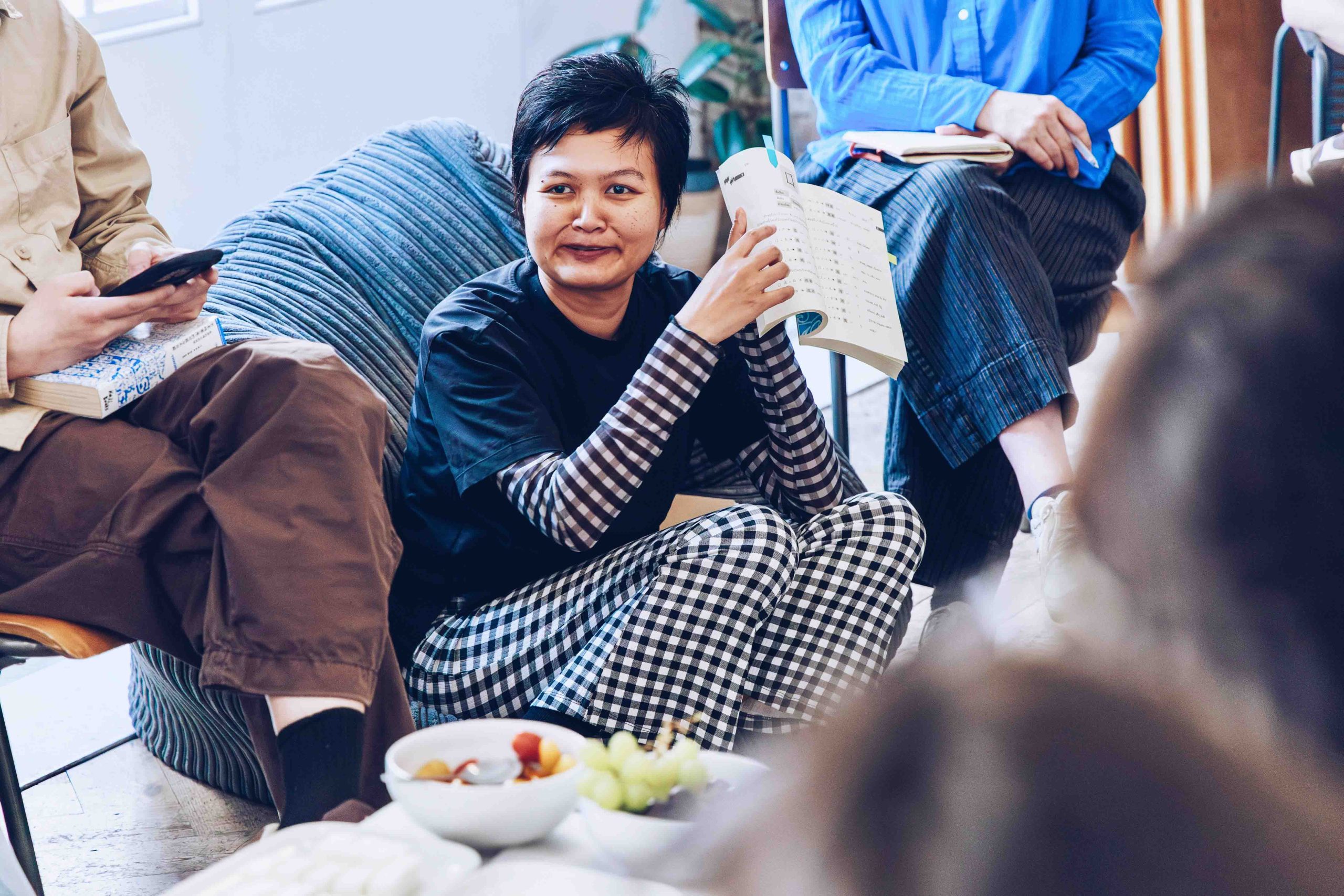
Clarice Lispector – Happy Birthday (Laços de Família)
Excerpt shared by: Helena Beese
In a birthday scene, the grandmother’s act of cutting the cake exposes the ceremonial, sometimes grotesque and dramatic dimensions of aging: “And suddenly the old woman grabbed the knife. And without hesitation, as if hesitating for a moment she might fall over, she cut the first slice with a murderer’s thrust.”
Byung-Chul Han – The Scent of Time
Excerpt shared by: Jane Lee
The atomization of time creates a state of dispersion beyond mere acceleration. One line Jane shared especially stood out to me: “And one ages without ever growing old.” This quote captures the subtle connection between the crisis of temporality and the experience of ageing.
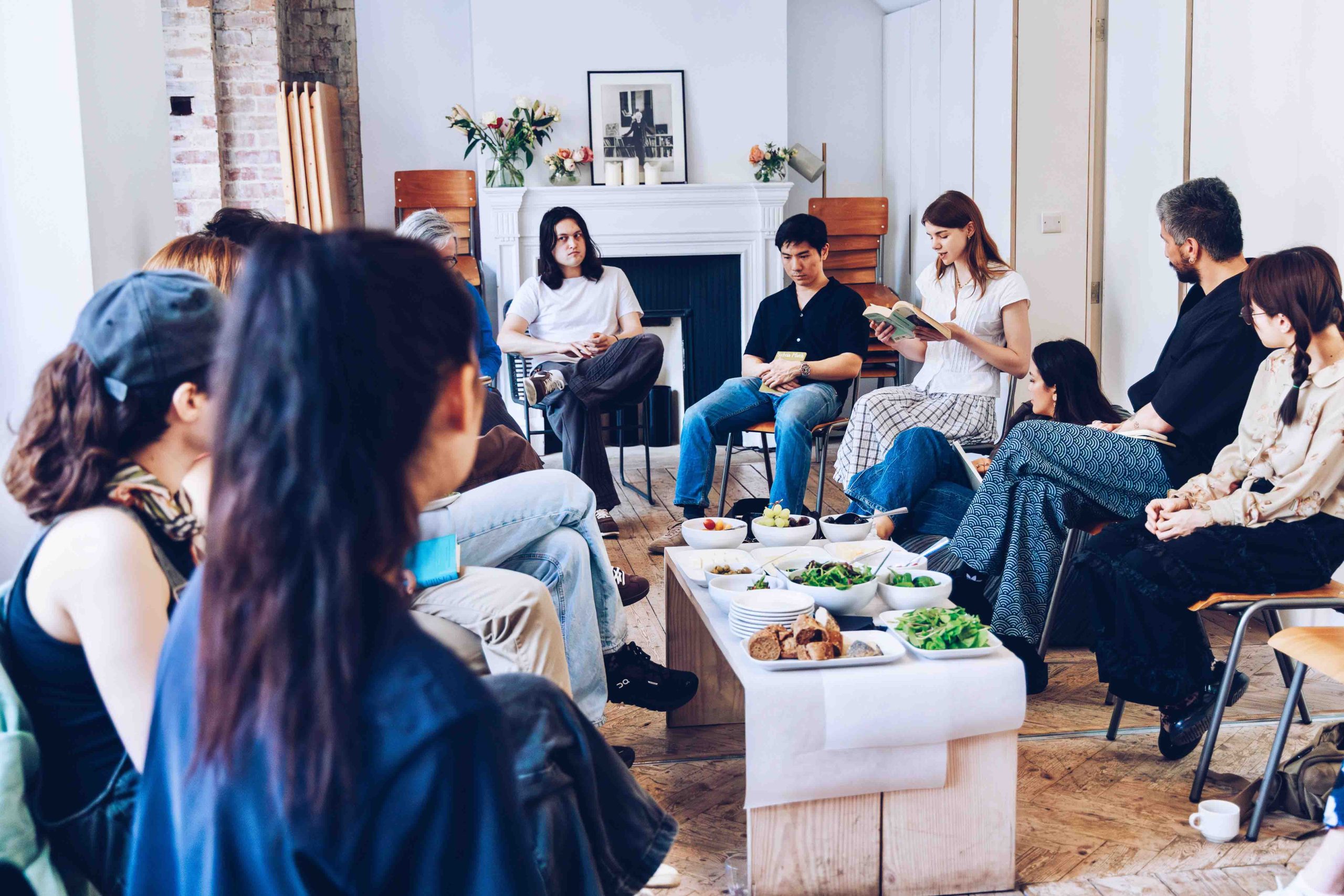
Michael Ende – Momo
Reflection shared by: Aida Adilbek
Instead of reading a passage, Aida shared what Momo made her feel. The novel, which prompts reflection on childhood, time, and loss, served as an indirect yet powerful entry into the subject of aging.
Tiqqun – Preliminary Materials for a Theory of the Young-Girl
Excerpt shared by: Yasmine Anlan Huang
Huang confessed she hadn’t thought much about aging before. Yet this concept of “going out of circulation” made her consider aging differently: “The Young-Girl becomes demonetized when she goes out of circulation.” This was a critique of a system where youth is associated with value, and aging with devaluation.
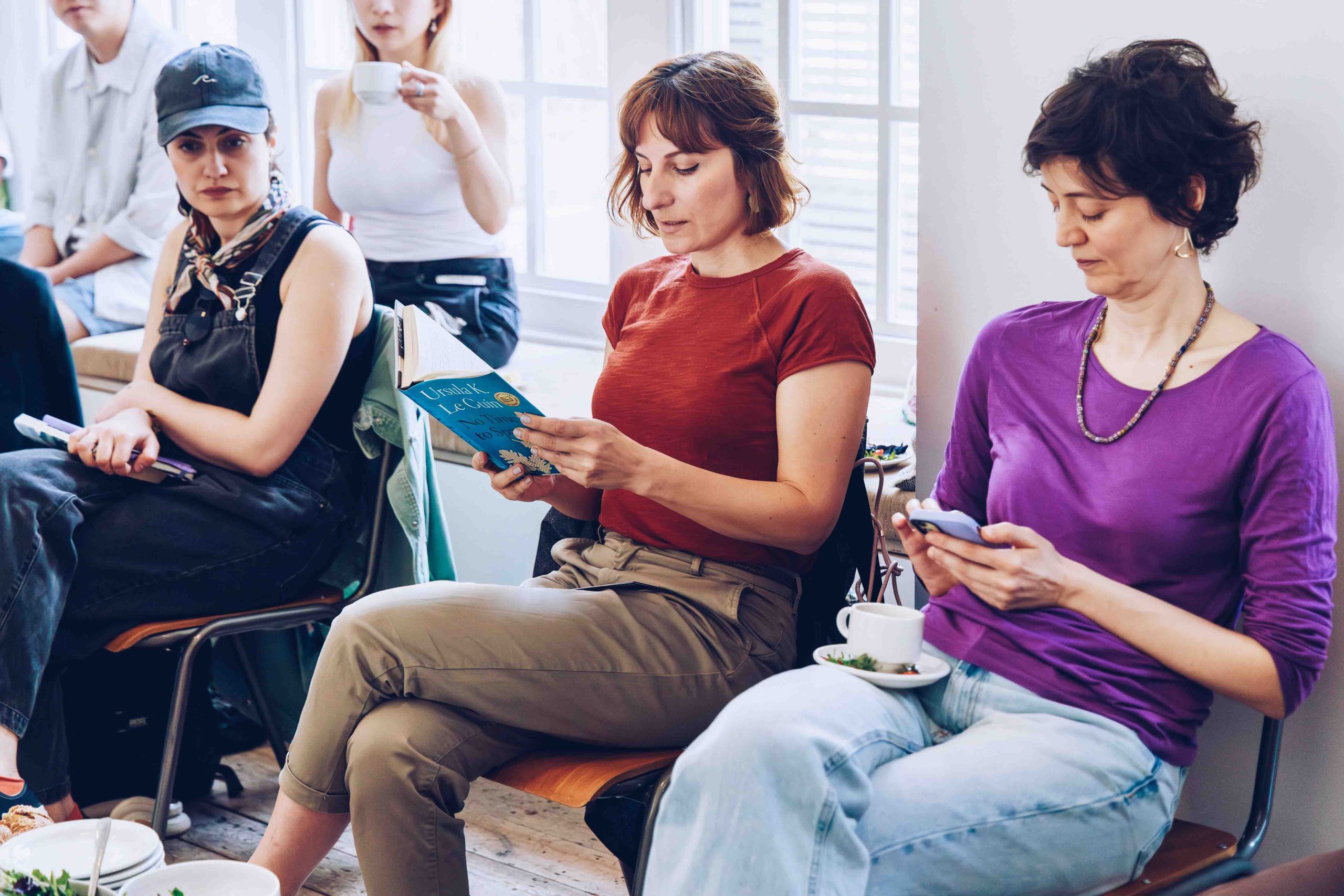
Ursula K. Le Guin – No Time to Spare
Excerpt shared by: Ülgen Semerci
Le Guin confronts the denial of aging directly: “To tell me my old age doesn’t exist is to tell me I don’t exist. Erase my age, you erase my life – me.” As a beloved author, Le Guin became the heart of the gathering—affirming that recognition matters more than avoidance.
Original text by: Intizor Otaniyozova
Intizor’s reflection on her family, time, and mortality was deeply moving: “I see my mother and father as flowers: delicate, fragile, decaying like pieces of art.” Her words brought forward the emotional resonance of ageing through intergenerational relationships.
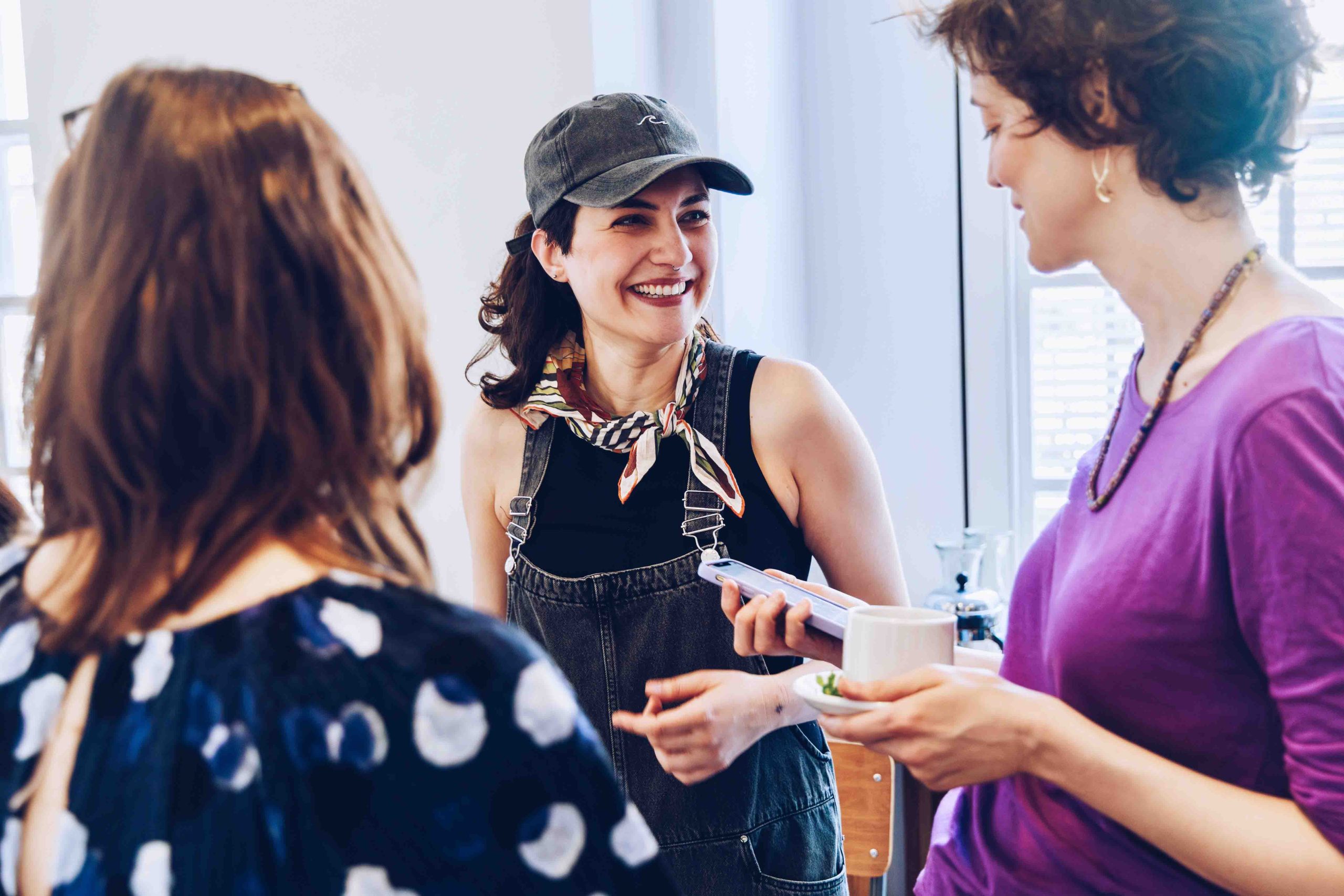
Annie Ernaux – A Woman’s Story
Excerpt shared by: Gigi Surel
Gigi shared a passage from Ernaux’s account of her mother’s dementia: “She started furiously, forming piles of handkerchiefs… she carried around with her, entering a state of near panic as soon as she lost sight of it.” This excerpt highlighted the tangled emotional threads of care, shame, loss, and love in old age.
Original reflection by: Zhejun Gao
Zhejun posed three thought-provoking questions: “What does ageing mean for non-human beings? How is technology transforming the way we experience and understand ageing?” Their inquiries expanded the framework of ageing beyond human biology to contemporary ecological and technological contexts.
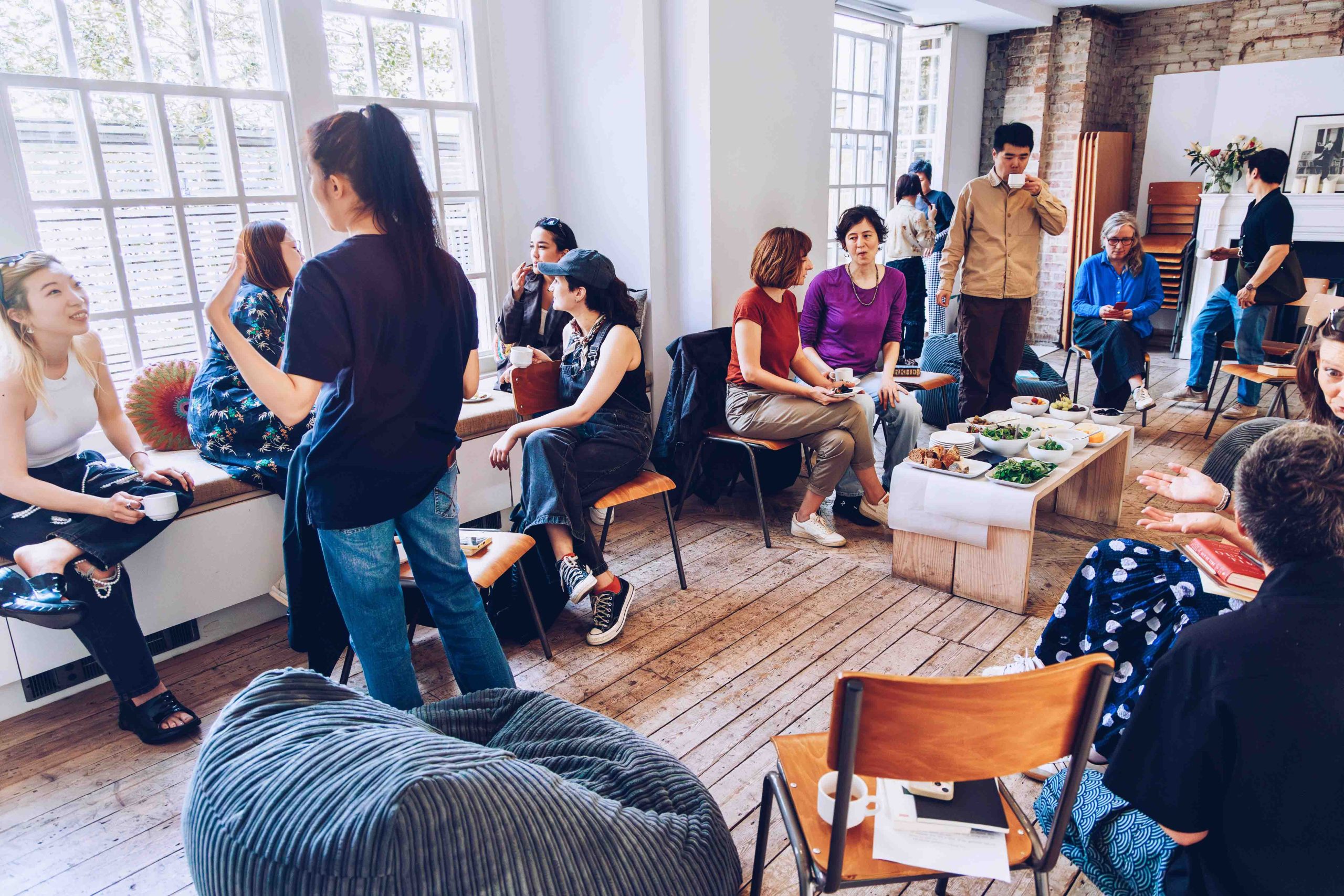
Banana Yoshimoto – The Kitchen (from Moonlight Shadow)
Excerpt shared by: Erin Li
Erin’s chosen line offered a poetic closure: “I must keep living with the flowing river before my eyes. For waving good-bye, I thank you.” It expressed a gentle acceptance of time’s flow, the grace of parting, and the desire to keep living.
This collective text that emerged after the event serves both as a form of documentation for my research process and as a memory object. At the same time, it offers references to my artistic practice, to collective production, and to the notion of empathy. In this period of reflecting on the phenomenon of ageing, this gathering opened up a polyphonic space for my practice. The space of encounter created by the book club we held at Delfina Foundation transformed me not only as an artist researching ageing, but also as an individual living through it. This text, which I can call “a collage woven from quotations,” will also form the backbone of future works—because ageing, rather than being what we are, is what we are becoming. And perhaps thinking side by side is the most political, most human aspect of ageing…
Huo Rf’s residency at Delfina Foundation was supported by SAHA Association. Delfina Foundation has been working in partnership with SAHA since 2013 on developing residency opportunities for cultural practitioners from Turkey. SAHA aims to contribute towards the presence and visibility of contemporary art from Turkey and offers its support to artistic projects working in line with this vision. SAHA directly collaborates with international arts institutions for the realisation of commissioned or invited projects; acts as a facilitator in the project development phase, and raises funds if and when necessary. Delfina Foundation and SAHA collaborate on residencies to support contemporary Turkish artists and curators as well as build awareness in the UK of contemporary art from Turkey via public programmes at Delfina Foundation.
